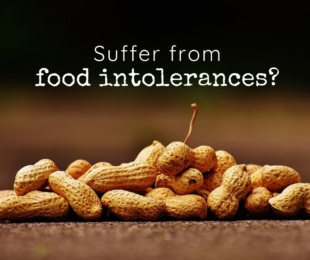
Food Intolerance: What You Need to Know
You’re careful about your health. You do your best to eat well, and you pay attention to the ways that your diet affects your energy levels. But something seems off. You’re experiencing annoying symptoms that you can’t explain. You’re often gassy and bloated, your skin may not be clear and glowing anymore, you may be ready for a nap after a meal and you wish you could remember where you put your keys. Why does your memory feel so foggy?
These issues are frustrating (and often embarrassing). They’re also very common. Many patients come to see me with healthy lifestyles, but are baffled by continuing digestive issues, mysterious rashes, and low energy levels. If this sounds familiar, it may be time to take a good look at your diet. Even a “healthy” food can make you sick if your body is sensitive to it. For many, the food mystery becomes both frustrating and overwhelming when trying to understand what foods are nourishing you and not making you feel terrible.
But the good news is that you may not have to look very far to make changes that relieve your symptoms. With a bit of detective work, and a bit of help, you can map out a dietary plan that restores your well-being.
What are the Symptoms of Food Intolerance?
Food intolerance can be tricky to diagnosis. One reason is that there’s no one-size-fits-all description of the way our bodies react. Symptoms vary from person to person and can even be different depending on what else is happening in your body. For example, you might respond differently at different stages of your menstrual cycle.
Food intolerance symptoms can include:
- Gas
- Bloating
- Bowel problems
- Sore joints
- Migraines
- Dark circles under your eyes
- Brain fog – that annoying forgetfulness and lack of clarity
- Unexplained rashes and skin blemishes
Another reason why food intolerance is often a missed diagnosis is that these symptoms can be delayed up to 24 hours after a meal, so many people don’t make the connection between what they ate and how they feel.
Similarly, it’s difficult to measure how many people suffer from food intolerances because a lot of us don’t seek medical help, figuring that it’s “normal” to feel gassy and tired all of the time. In fact, conventional medical practitioners can be skeptical about food intolerance symptoms, which can lead to frustration for patients. But it doesn’t have to be this way.
What Causes Food Intolerances?
It’s important to recognize the difference between food allergies and food intolerances. Food allergies are immune reactions. After eating a certain food, your body’s immune system launches an attack by making its own protein, called immunoglobulin E (IgE). The next time you consume that food, your body is ready to attack again. But the IgE causes your body to release a chemical called histamine, which triggers the physical symptoms of an allergic reaction.
In contrast, a food intolerance is often the result of our body not being able to process a certain food. We may lack the enzymes necessary to digest a substance that the food contains. For example, some people may develop a lactose intolerance if their small intestine doesn’t produce enough of the enzyme lactase.
If we continue the eat that problem food, we can exacerbate the intolerance and our symptoms can affect more aspects of our bodies. Because our digestive system doesn’t adequately break down elements (for example, lactose) in the food, the lining of the gut can become inflamed and damaged. Eventually, it can become permeable, so the undigested material “leaks” into the bloodstream. Not surprisingly, this is called “leaky gut” syndrome.
Why does leaky gut syndrome make us feel so lousy? There is growing evidence that the microorganisms in our guts exist in a complex relationship with our brains – what scientists call the “microbiome-gut-brain axis.” In other words, a food intolerance and the resulting leaky gut can affect our brains, and, as a result, our moods and energy levels. And that’s in addition to the general discomfort we can feel with digestive difficulties. No wonder patients with food intolerances are often exhausted!
But what is the root cause of food intolerances? And why are they becoming increasingly common? Research is still developing, but there are a few theories, ranging from changes in farming practices to the increased use of antibiotics, which can affect our gut bacteria and make it difficult to digest certain foods.
Which Foods Can Cause Food Intolerances?
Somewhat ironically, many foods that can lead to intolerance symptoms are considered “healthy” foods. As a result, it’s easy to keep eating them, hoping they will improve your health and help you feel better. Yes, it’s a bit of a Catch-22! Common food intolerance culprits include:
- Dairy: The lactose found in goat and cow milk, as well as soft cheeses, ice cream and yogurt is difficult for our gut to break down. In addition to the lactose, many people react to the proteins (whey and casein) in dairy. If you aren’t sure whether it’s the lactose or the protein, try A2 Milk. It has a different protein than standard dairy. If you don’t react to it, you know it’s the casein you have an issue with.
- Gluten: Gluten is a protein (or family of proteins) found in wheat, rye, barley, oats, and other grass-related grains. It’s often a hidden ingredient. For example, many spices and sauces contain gluten.
- Fructose intolerance: Fructose is a simple sugar found in many fruits. High fructose corn syrup is found in processed foods like cereal bars and some juices.
- Histamine and other amines: Amines are found in strongly flavored foods such as cheese, ripe fruit, chocolate, and processed meats. These foods are often migraine triggers for people with an intolerance.
This is not a definitive list of food intolerance triggers. We’re all biologically different, and there is no universal recipe for food intolerance. That’s one reason why seeing a medical professional is a good idea if you suspect your food may be making you sick. In addition, medical supervision can ensure your approach to food remains healthy and balanced. Research suggests that food intolerances can be a trigger for disordered eating in some people. After all, if food is causing you pain, but you’re not sure which foods are to blame, it’s easy to associate your diet with negative experiences.
How Can You Treat Food Intolerances?
On the surface, treating a food intolerance sounds simple: just eliminate the problem foods. But first, you’ll have to do a bit of detective work. Because of possible delayed reaction times, the troublesome food is not always obvious. Begin with keeping detailed records of everything you eat. Then, under medical supervision, you can start eliminating foods, then reintroducing selected foods, carefully tracking your symptoms.
While you’re following an elimination diet like this, a holistic practitioner can provide ways to support your gut health. And as you work to track down the problem foods, you’ll want to avoid substances that are known to cause inflammation, such as alcohol.
If you think your foods might be causing your health issues, pay attention to your symptoms, log foods and feeling and energy, and work with your trusted health practitioner or team to get yourself back on track.
References
https://www.ncbi.nlm.nih.gov/pubmed/28936357
https://www.ncbi.nlm.nih.gov/pmc/articles/PMC5603184/
https://www.sciencedirect.com/science/article/abs/pii/S0277953608002773
https://www.ncbi.nlm.nih.gov/pubmed/7460264
https://www.nature.com/articles/s41575-018-0064-z
https://www.sciencedirect.com/science/article/pii/S0306453018303950
https://my.clevelandclinic.org/health/diseases/10009-food-problems-is-it-an-allergy-or-intolerance








